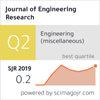利用 ANFIS-PSO 混合机器学习模型估算土壤的再压缩系数
IF 0.9
4区 工程技术
Q3 ENGINEERING, MULTIDISCIPLINARY
引用次数: 0
摘要
再压缩系数(Cr)是用于预测过度固结土壤固结沉降的一个重要参数。因此,这项工作的主要目的是使用自适应神经模糊推理系统(ANFIS)和粒子群优化(PSO)混合的 ANFIS-PSO 机器学习(ML)模型来准确估算 Cr。为了比较所提模型的性能,我们选择了另外两个基准 ML 模型:单一 ANFIS 和支持向量机 (SVM)。我们收集并利用了来自越南多个建筑项目的 304 个土壤样本数据,其中包括 12 个输入变量(土壤参数)和 1 个输出变量(Cr)。我们利用相关系数(R)、均方根误差(RMSE)和平均绝对误差(MAE)等验证指标来验证模型的性能。特征选择的相关分析结果表明,粘土含量、塑性指数、流动性指数、饱和度、比重、干密度和体积密度这七个输入变量非常重要,因此被选中用于预测 Cr。验证结果表明,与其他两个基准模型 SVM(R = 0.727)和单一 ANFIS(R = 0.734)相比,混合 ANFIS-PSO 模型的预测能力(R = 0.802)最好。我们的研究结果表明,ANFIS-PSO 是一种强大的 ML 工具,可有效、快速地预测土壤的 Cr。这有助于节省时间,降低与实验室实验相关的成本,从而确定这一重要的岩土参数。本文章由计算机程序翻译,如有差异,请以英文原文为准。
Estimation of recompression coefficient of soil using a hybrid ANFIS-PSO machine learning model
Recompression coefficient (Cr) is =an essential parameter utilized to predict consolidation settlement of over-consolidated soil. Thus, the main aim of this work was to estimate accurately the Cr, using a hybrid ANFIS-PSO Machine Learning (ML) model that is a hybridization of Adaptive Neuro-Fuzzy Inference System (ANFIS) and Particle Swarm Optimization (PSO). To compare the performance of proposed model, we selected two other benchmark ML models: single ANFIS and Support Vector Machines (SVM). We collected and utilized the data of304 soil samples tested from various construction projects in Vietnam, which included 12 input variables (soil parameters) and one output variable (Cr). Validation indices, namely Correlation Coefficient (R), Root Mean Square Error (RMSE), and Mean Absolute Error (MAE) were utilized for the validation of the model’s performance. Correlation analysis of feature selection results indicated that seven input variables namely clay content, plasticity index, liquidity index, degree of saturation, specific gravity, dry density, and bulk density were of importance and thus selected for prediction of the Cr. Validation results indicated that predictive capability of the hybrid ANFIS-PSO model (R = 0.802) is the best in comparison with other two benchmark models namely SVM (R = 0.727) and single ANFIS (R = 0.734). The findings of our study suggest that the ANFIS-PSO is a powerful ML tool for effectively and quickly prediction of the Cr of soil. This can help save time and reduce costs associated with laboratory experiments for determining this important geotechnical parameter.
求助全文
通过发布文献求助,成功后即可免费获取论文全文。
去求助
来源期刊

Journal of Engineering Research
ENGINEERING, MULTIDISCIPLINARY-
CiteScore
1.60
自引率
10.00%
发文量
181
审稿时长
20 weeks
期刊介绍:
Journal of Engineering Research (JER) is a international, peer reviewed journal which publishes full length original research papers, reviews, case studies related to all areas of Engineering such as: Civil, Mechanical, Industrial, Electrical, Computer, Chemical, Petroleum, Aerospace, Architectural, Biomedical, Coastal, Environmental, Marine & Ocean, Metallurgical & Materials, software, Surveying, Systems and Manufacturing Engineering. In particular, JER focuses on innovative approaches and methods that contribute to solving the environmental and manufacturing problems, which exist primarily in the Arabian Gulf region and the Middle East countries. Kuwait University used to publish the Journal "Kuwait Journal of Science and Engineering" (ISSN: 1024-8684), which included Science and Engineering articles since 1974. In 2011 the decision was taken to split KJSE into two independent Journals - "Journal of Engineering Research "(JER) and "Kuwait Journal of Science" (KJS).
 求助内容:
求助内容: 应助结果提醒方式:
应助结果提醒方式:


